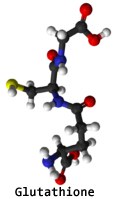 Could a simple dietary change that increases glutathione, or indeed supplementation with this antioxidant tripeptide, be all you need to boost your immune system and ward of influenza? Several Sciencebase correspondents and hundreds of “bloggers” selling supplements seem to think so…but I am not so sure, despite the couple of limited research papers that they cite again and again in their marketing literature.
Could a simple dietary change that increases glutathione, or indeed supplementation with this antioxidant tripeptide, be all you need to boost your immune system and ward of influenza? Several Sciencebase correspondents and hundreds of “bloggers” selling supplements seem to think so…but I am not so sure, despite the couple of limited research papers that they cite again and again in their marketing literature.
Initially, it seems, the results of a small trial published in 1997 suggested that administration of N-acetylcysteine during the winter could affect the severity of influenza symptoms, especially in elderly high-risk individuals. “N-acetylcysteine did not prevent A/H1N1 virus influenza infection but significantly reduced the incidence of clinically apparent disease,” the paper said.
N-acetylcysteine is an analog and precursor of reduced glutathione, which has been in clinical use for decades as a drug to reduce mucous. More recently, it has been proposed for use in the therapy and/or prevention of several respiratory diseases and of diseases involving oxidative stress, in general.
Evidence grew ever so slightly for a role for glutathione itself in 2000, when Emory University researchers led by Dean Jones reported that a lozenge or oral spray containing glutathione might help prevent infection with influenza. Trials in humans had not been carried out but details were reported in Free Radical Biology and Medicine and elsewhere.
Jones is more recently on record as saying that a good diet is key to getting enough glutathione, so how supplementation fits into that picture I don’t know:
Glutathione occurs naturally in many foods, and people who eat well probably have enough in their diets, says Jones, professor of biochemistry and director of nutritional health sciences at Emory University in Atlanta. Those with diets high in fresh fruits and vegetables and freshly prepared meats are most likely just fine. On the other hand, those with poor diets may get too little.
Then, in 2006, an article entitled A nutritional supplement formula for influenza A (H5N1) infection in humans put forward (again) the (same) hypothesis that this might be possible.
The 1997 and 2006 papers are now widely touted by those selling glutathione supplements to purportedly help prevent infection with H1N1 the current pandemic swine flu virus, previously they were marketing on the back of H5N1 bird flu scaremongering. However, the 2006 paper was published in the journal Medical Hypotheses and really did only suggest that glutathione supplements might be an interesting avenue of research in the face of a global flu pandemic. It did not, as far as I can see, run widescale, double-blind, randomised placebo-controlled clinical trials to test the hypothesis.
The researchers hinted that the compound could interfere with the virus itself or somehow modulate immune system biochemistry, or somehow inhibit the so-called cytokine storm. They said that it might, “aid humans infected with H5N1 influenza to survive with a reduced likelihood of major complications.” But, their hypothesis did home in on a single mode of action. It is thus difficult to determine whether any of those it suggests are in any way valid or simply scientific dead-ends.
A disclaimer in the paper states that, “The nutritional supplement formula described in part herein is patent-pending and has been licensed to Douglas Laboratories, Pittsburgh, Pennsylvania, as “Hi-Vidomin Nutritional Immune Multi” for sale in the healthcare practitioner market.” The authors are named as author Howard Friel who has written on emerging viruses, climate change, and globalization, and Harvey Lederman, Medical Director of the Pioneer Valley Family Practice, Northampton, MA. Why they make that disclaimer so prominent, I’m not sure.
Regardless, if glutathione is actually effective against influenza infection, and it probably isn’t, then it would presumably have to be present at the infection site – mouth and nose and upper respiratory tract. No definitive clinical trials have proven efficacy one way or the other yet.
Direct application to the oral cavity either under the tongue, as a lozenge, or as an oral spray would seem to be the only way to get glutathione to the viral entry points. A spray or lozenge has not yet been clinically proven for human use, although there are plenty of websites selling sprays nevertheless and perhaps not coincidentally offering get-rich-quick schemes at the same time.
Before you rush out to buy any expensive dietary supplements, take a close look at your diet. Is it well-balanced, rich in fruit and vegetables? If it is then you are unlikely to be deficient in glutathione.
I have written about medical opinions of echinacea and other supplements in the battle to ward off influenza elsewhere. After many years of small-scale and limited trials, the jury is still out on echinacea and glutathione specifically. I’d be interested to hear from anyone who has new insights into whether or not this compound is yet another pseudo-medical scam or a genuine way to reduce flu symptoms. I strongly suspect it’s the former rather than the latter.
![]() FRIEL, H., & LEDERMAN, H. (2006). A nutritional supplement formula for influenza A (H5N1) infection in humans☆ Medical Hypotheses, 67 (3), 578-587 DOI: 10.1016/j.mehy.2006.02.040
FRIEL, H., & LEDERMAN, H. (2006). A nutritional supplement formula for influenza A (H5N1) infection in humans☆ Medical Hypotheses, 67 (3), 578-587 DOI: 10.1016/j.mehy.2006.02.040